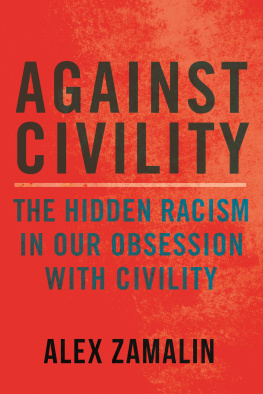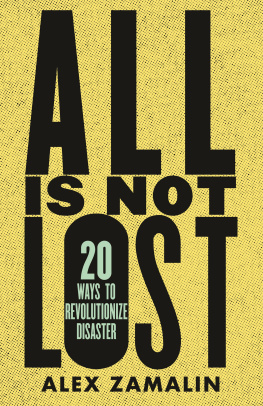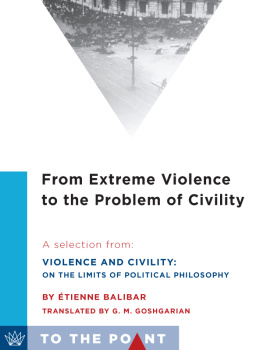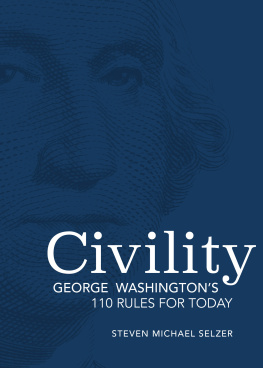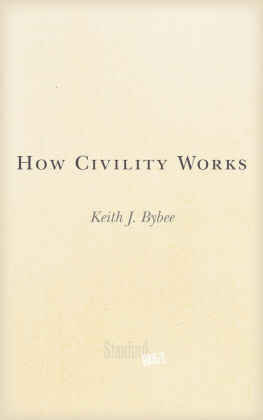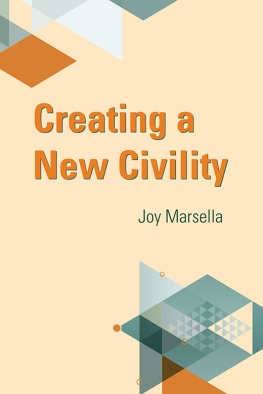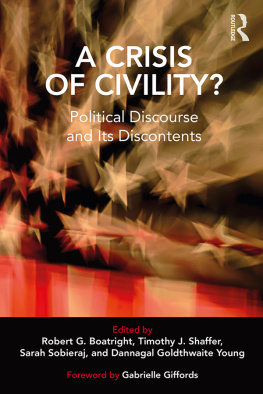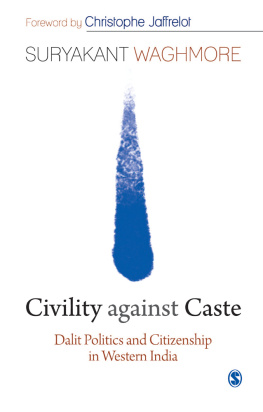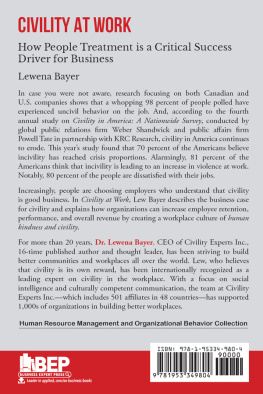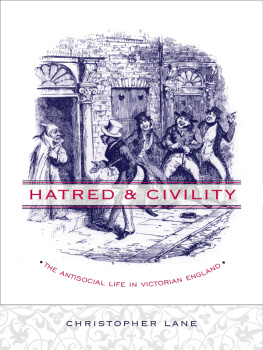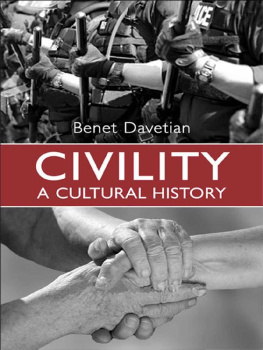Alex Zamalin - Against Civility: The Hidden Racism in Our Obsession with Civility
Here you can read online Alex Zamalin - Against Civility: The Hidden Racism in Our Obsession with Civility full text of the book (entire story) in english for free. Download pdf and epub, get meaning, cover and reviews about this ebook. year: 2021, genre: Politics. Description of the work, (preface) as well as reviews are available. Best literature library LitArk.com created for fans of good reading and offers a wide selection of genres:
Romance novel
Science fiction
Adventure
Detective
Science
History
Home and family
Prose
Art
Politics
Computer
Non-fiction
Religion
Business
Children
Humor
Choose a favorite category and find really read worthwhile books. Enjoy immersion in the world of imagination, feel the emotions of the characters or learn something new for yourself, make an fascinating discovery.
- Book:Against Civility: The Hidden Racism in Our Obsession with Civility
- Author:
- Genre:
- Year:2021
- Rating:3 / 5
- Favourites:Add to favourites
- Your mark:
- 60
- 1
- 2
- 3
- 4
- 5
Against Civility: The Hidden Racism in Our Obsession with Civility: summary, description and annotation
We offer to read an annotation, description, summary or preface (depends on what the author of the book "Against Civility: The Hidden Racism in Our Obsession with Civility" wrote himself). If you haven't found the necessary information about the book — write in the comments, we will try to find it.
Alex Zamalin: author's other books
Who wrote Against Civility: The Hidden Racism in Our Obsession with Civility? Find out the surname, the name of the author of the book and a list of all author's works by series.
Against Civility: The Hidden Racism in Our Obsession with Civility — read online for free the complete book (whole text) full work
Below is the text of the book, divided by pages. System saving the place of the last page read, allows you to conveniently read the book "Against Civility: The Hidden Racism in Our Obsession with Civility" online for free, without having to search again every time where you left off. Put a bookmark, and you can go to the page where you finished reading at any time.
Font size:
Interval:
Bookmark:


For Alison, Sam, and Anita


From the moment he launched his presidential campaign in the summer of 2015 by descending an escalator in New Yorks Trump Tower, Republican Donald Trump decisively rejected the rules of public decorum for politicians. He unapologetically called Mexicans rapists and proposed a total shutdown of Muslim immigration to the United States. He wouldnt denounce the white supremacistssuch as David Duke, former Grand Wizard of the Louisiana Ku Klux Klanwho had endorsed him. And so he emboldened hardened racists who felt stiffed after eight years under a black president to speak their minds, bringing all their venom that lurked just below the surface of American society back into the mainstream. In a nonstop barrage of tweets, he hurled personal insults against his opponents. Women were subject to sexist tirades about their bodies, disabled people were mocked, and asylum seekers characterized as mass murderers.
Although many of his statements were lies, to his loyal supporters, Trump was a truth-teller of the first order. But to his critics, he was the most dangerous political figure ever to get so close to power. During the presidential campaign, many media pundits convinced themselves Trump was a bad dream, a reality TV actor and failed businessman who was just temporarily basking in the spotlight to make an extra buck and trying to bolster his ego and quench his insatiable thirst for power. Nothing could have prepared them for November 4, 2016, when the unbelievable happened: Trump was elected over Democrat Hillary Clinton and would soon become the forty-fifth president of the United States.
Total dread soon turned into mass defiance. On January 21, 2017, the day after Trumps inauguration, millions of people across the world protested his presidency. In the US, the Womens March in Washington, DC, drew almost five hundred thousand people, and in big cities and small towns, estimates suggested that anywhere from three to five million people joined affiliated demonstrations. Women organized the march, but it became a rallying cry for all those opposing Trumps far-right policy vision of gender and racial inequality, environmental degradation, and economic privatization. Eventually, participants in the march, and those who supported it, called themselves the Resistance to Trumps presidency. This diverse group of protesters didnt agree on everything. Some thought Trumps electoral college victory violated democratic principles; others worried about Russian meddling in the 2016 US elections; some were afraid of Trumps authoritarianism, while others saw in his victory a continuation of thirty years of reactionary presidencies from Richard M. Nixon to Ronald Reagan to George W. Bush. But there was one thing of which every member of the Resistance was certain: Trump didnt represent their views, and they would fight his agenda.
As the days became months and months became years, a consensus narrative has emerged: to combat Trump and the divisiveness that his presidency has spurred, we need to be more civil with one another. Everywhere you lookthe New York Times, CNN, National Public Radiopundits, journalists, and best-selling authors prescribe this antidote to our infighting. The center-right Times op-ed columnist David Brooks said, I think weve gotten out of the habit of talking about what is good character and what is good morality.
Were told that the most effective way to oppose Trump and save the soul of our nation is to be politer, less rancorous and embittered, more compassionate and rule-abiding, more responsible in our choices and empathetic in our dialogue. Dont be too disruptive or unruly in the streets. Play by the rules of the game. Look to compromise when you can. Dont rock the boat. Dont be too loud. Stop being so angry. Listen to the police and obey their orders. Follow the law at all times.
Invocations to be more civil are directed toward both sides of the political aisle. Civility is recruited to criticize the rhetoric of both white supremacistscharacterized by the white nationalist rally in Charlottesville, Virginia, in 2017 and the rise of the racist alt-rightand Movement for Black Lives (also known as Black Lives Matter) protesters. Civility is said to be lacking in activists toppling Confederate statues in the South and in students occupying university buildings, as hundreds did at the University of Vermont in February 2018 to push for more inclusive and anti-racist administrative policies, or as Howard University students did in April of that year to push for more affordable housing on campus. And civility is invoked when college administrators and professors denounce the culture of political correctness in their defense of free speech and academic expertise. As the current president of Wesleyan University, historian Michael S. Roth, recently asserted in a blog post, Name-calling or assuming the status of the victimized is among the least productive forms of disagreement. Outrage may lead to feelings of solidarity, but it insulates us from the possibility of changing our minds, from opening our thinking... Citizens must avoid falling into the tired tropes of both callout culture and accusations of political correctness.
Also implored to be more civil are professional athletes, such as former San Francisco 49ers quarterback Colin Kaepernick or National Football League defensive back Malcolm Jenkins, who take a knee or raise clenched fists during the national anthem before sporting events to oppose systemic racism. And so are those who loudly decry them as unpatriotic and demand for the immediate restoration of a besmirched national honor.
Civility is beneficial for a society beset by extremism, say political observers who claim the center and define themselves against the fringe. As liberal democratic norms wane across the globewith the rise of far-right authoritarian, anti-immigrant regimes in Poland, Hungary, Brazil, and the Philippines, and the growing popularity of political parties like Alternative for Germany (AFD) or the National Rally (formerly the National Front led by Marine Le Pen) in Francecivility appeals to the mainstream because it conjures a common ground, a nonpolitical arena where agreement isnt too far away, where consensus is within reach, where moderation counters aggression, where reason trumps the irrational.
Nowhere is this truer than when it comes to race. Because de jure racial segregation was abolished with Brown v. Board of Education of Topeka, Kansas; landmark civil rights legislation of the 1960s was passed; and the first black president, Barack Obama, was twice elected, there is the feeling among centrist Democrats, Republicans, and independents thatdespite Trumps dangerous rise and the white nationalist elements he has unleashedcivility is indispensable for progress. Equality can be incrementally expanded only if Obamas legacyof signing into law the Affordable Care Act of 2010, of increasing aid to community colleges, of trying to incrementally reduce mass incarceration, of diminishing the pay gap between men and women, and of reaching across the aisleis remembered and reaffirmed. And only by these incremental measures can we achieve freedom for all. The underlying thinking can be boiled down to this: Yes, Trump won, but only because elements of the white working class who tended to vote Democrat were swayed by his false promises and because so many others, utterly unenthused and disgusted by the incivility on both sides, stayed home. We must therefore double down on what former First Lady Michelle Obama said, which was echoed by Democratic presidential candidate Hillary Clinton during the 2016 election: When they go low, we go high.
Font size:
Interval:
Bookmark:
Similar books «Against Civility: The Hidden Racism in Our Obsession with Civility»
Look at similar books to Against Civility: The Hidden Racism in Our Obsession with Civility. We have selected literature similar in name and meaning in the hope of providing readers with more options to find new, interesting, not yet read works.
Discussion, reviews of the book Against Civility: The Hidden Racism in Our Obsession with Civility and just readers' own opinions. Leave your comments, write what you think about the work, its meaning or the main characters. Specify what exactly you liked and what you didn't like, and why you think so.

